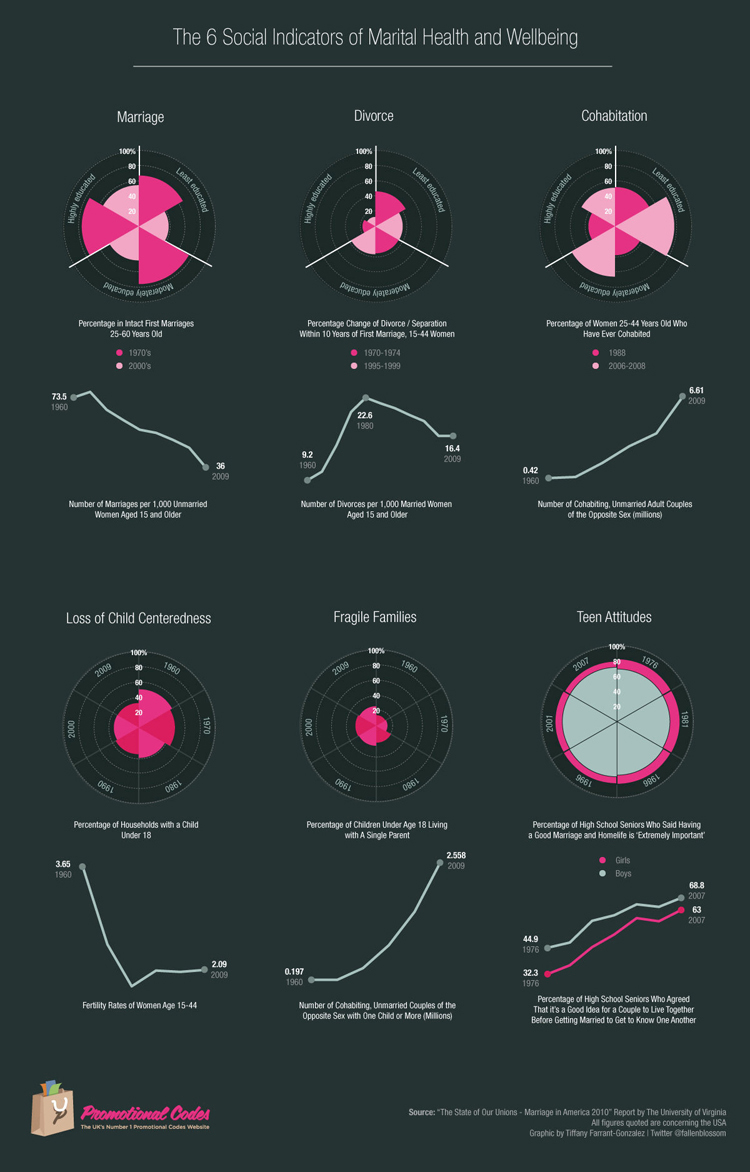You'll be surprised to see who values marriage the most in modern America.American marriages have never been more precarious. But why do marriages fall apart, and how are families changing as a result?
The following infographic, by Tiffany Farrant and PromotionalCodes.org.uk, casts a piercing eye on the institution. Based on the annual report by The National Marriage Project, it paints a picture of marriage becoming a less and less relevant factor in the way American's live and raise children. The short version: Marriage is simply shrinking as a cultural value; where 66% of women over 15 were married in 1960, the figure has shrunk every decade since.* Now, it's just 51%:
[Click to visit large version]But perhaps the most surprising fact is who is getting married -- and staying married. Conservative pundits will gleefully tell you that the educated elite are busy destroying every last thing that America holds dear, with family values being at the top of the list. (At the same time, when Levi Johnston first promised to marry Bristol Palin, this was held as some sort of ideal. How'd that work out?) But the fact is that being educated, making more money, waiting on kids, getting married late, and being religious are the most reliable indicators that your marriage will last:
[Click to visit large version]Now, to say that marriage is disappearing isn't to say that people are opting to remain single. Rather, it appears that couples are living together in presumably monogamous relationships without getting married at all, while child rearing has become more and more disconnected from the institution of marriage:
[Click to visit large version]*You might think that one very small reason is the fact that the legal age of marriage has changed over time, but the researchers have controlled for this using statistical methods.
[Via PromotionalCodes.org.uk]
Cliff Kuang
Cliff is the editor of Co.Design, and in the past has written regularly for WIRED, Popular Science and GOOD. ... Read more
Original reports summarizing the latest statistics on U.S. families. These profiles examine topics related to NCFMR's core research themes. Data are presented at both the national and state levels using new data resources.
Click one of the highlighted family profile links to view that document.
2011
FP-11-01 U.S. Families and Households: Economic Well-being 2010
FP-10-08 Same-Sex Couple Households in the U.S., 2009 FP-10-07 Trends in Cohabitation: Twenty Years of Change, 1987-2008 FP-10-06 First Divorces in the U.S., 2008 FP-10-05 Rate of First Marriage in the U.S., 2008 FP-10-04 Thirty Years of Change in Family Roles and Parenthood Attitudes, 1976-2008 FP-10-03 Thirty Years of Change in Marriage and Union Formation Attitudes, 1976-2008 FP-10-02 Cohabitation in the U.S., 2006-2008 FP-10-01 Marital Status in the U.S., 2008 2009
FP-09-03 Median Age at First Marriage in the U.S., 2008 FP-09-02 Divorce Rate in the U.S., 2008 FP-09-01 Marriage Rate in the U.S., 2008

Just in time for Black Marriage Day, tomorrow Lamar and Ronnie Tyler the couple behind Happily Ever After and You Saved Me present their new film “Men Ain’t Boys.” The Tyler’s traveled across the country to interview 45 men and multiple experts about the true definition of manhood in the Black community. A resounding theme in the film is how these men (all of whom are married) express their love. Watch as men from ages 22 to 77 explain not just why they love their wives but more importantly how they display their love. The Tylers hope to portray positive examples of Black men on film in a fashion that has never been done before with Men Ain’t Boys. The end desire is to present a blueprint for what real manhood is in our communities and families for not only men but also for our women and children.
With Black marriage numbers at an all time low and Black divorce numbers at an all time high the hopes of positive, lasting, relationships look bleak until now. Executive Producers Lamar and Ronnie Tyler bring real married couples to the screen to chronicle the greatest love stories ever told. These real couples explain how their marriages had a direct impact on their lives. Featuring candid and transparent looks inside of the hardships, trials, and ultimate success stories of these amazing couples. YOU SAVED ME offers an unprecedented look inside of real relationships and what is required to sustain them.
Originally scheduled to air tomorrow in selected areas to tie in with “Black Marriage Day” you can participate by writing to Tyler New Media P.O. Box 284 Grayson, Ga. 30017.
There is a full training program that you can participate by visiting www.blackmarriageday.com/Black_Marriage_Day/Welcome.html
Related Stories
Tags: marriage, relationshipsElev8 Links
- 30 Black Women You Should Know -- hellobeautiful.com
- Top 10 Religious Moments Of The Decade -- newsone.com
- Daylight Saving Time: How To Recoup That Stolen Hour -- huffingtonpost.com
- U.S. Has Highest Bipolar Rate--Why? -- huffingtonpost.com
- Twins Deliver Babies on Same Day at Same Hospital -- bvblackspin.com
- Britney Spears Joins Obama's Anti-Bullying Campaign -- popeater.com
An employer and I have been noticing that many of our employees are missing work and having to take time off to go to court because of marriage problems. I don't want to interfere in people's personal lives but at the same time it is costing the company money when these family problems occur. Do you think I should try to do anything about my employees' marriages?
D.C. Evansville
There are some things you can do as an employer to reach out to employees that need extra help in marriage and family situations. You could begin by displaying literature and brochures in the employee lounge. You could provide an array of information about healthy living, relationships and marriages. There are many nonprofit organizations in the community that would be willing to supply you with information.
Your Human Resources department might be another good point of contact for employees. One benefit you could offer to your employees would be to pay for all or part of the cost to attend a seminar or class pertaining to their situation. This business approach is not a new concept. Many businesses today implement Wellness Programs for employees. A marriage or relationship class could be included in that package.
A divorce hurts the couple and the community financially. The couple will have about a $19,000 loss and the community another $30,000 per divorce. According to Dr. John Curtis, author of "Happily Un-Married," an average employee making $20 per hour would cost the company more than $8,000. One survey, "The effect of marital dissolution on the labor supply of males and females," for the Journal of Socio-Economics (Mueller, 2005) found that employees lost an average of more than 168 hours of work time, equivalent to being fully absent for four weeks in one calendar year. Divorce does cost the company and the employee.
Businesses that work with employees to help strengthen marriages and families can reduce that. Your approach will be the key to the success of this venture. You would not want to single out employees, but offer a new program for all. A healthy marriage for employees will probably translate into a healthier employee for your business.
Research for "The Case for Marriage," by Maggie Gallagher and Linda Waite indicates that healthy marriages contribute to job satisfaction and productivity. An employee in a healthy marriage can concentrate on the job and not be distracted by problems at home.
Community Marriage Builders can help you and your company with workshops to help struggling couples and also be there for marriage preparation and marriage enrichment workshops as well.
John Phillips is executive director of Community Marriage Builders. He can be reached at john@makeitlast.org or (812) 477-2260.
Divorce changing the face of rural American families
By Sabrina Tavernise and Robert Gebeloff / New York Times News Service
Published: March 25. 2011 4:00AM PST
SIOUX COUNTY, Iowa — In the 1970s, the divorce rate was so low in rural northwest Iowa that it resembled the rest of America in the 1910s. Most of its 28,000 residents were churchgoers, few of its women were in the work force, and divorce was simply not done.
So it is a bitter mark of modernity that even here, divorce has swept in, up nearly sevenfold since 1970, giving Sioux County the unwelcome distinction of being a standout in this category of census data.
Divorce is still less common here than the national average, but its sharp jump illustrates a fundamental change in the patterns of family life.
Forty years ago, divorced people were more concentrated in cities and suburbs. But geographic distinctions have all but vanished, and now, for the first time, rural Americans are just as likely to be divorced as city dwellers, according to an analysis of census data by The New York Times.
“Rural families are going through this incredible transformation,” said Daniel Lichter, a sociology professor at Cornell University.
The shifts that started in cities have spread to less populated regions — women going to work, gaining autonomy and rearranging the order of traditional families. Values have changed, too, easing the stigma of divorce.
“In the bottom ranks, men have lost ground and women have gained,” said June Carbone, a law professor at the University of Missouri-Kansas City and co-author of “Red Families v. Blue Families.”
“A blue-collar guy has less to offer today than he did in 1979,” Carbone added. Those shifting forces, she said, “create a mismatch between expectation and reality” that can result in women becoming frustrated and leaving, because now they can.
Since 1990, class has become an increasingly reliable predictor of family patterns, Carbone said. College-educated Americans are now more likely to get married and stay married than those with only a high school diploma, a change from 20 years ago, she said, when differences were much smaller.
That trend has been particularly important for rural areas, which have fallen further behind urban ones in education, according to census data. Just one in six rural residents has a college degree, far fewer than in cities, where one in three does. Nationally, there were about 121 million married adults and 26 million divorced people in 2009, compared with about 100 million married and 11 million divorced people in 1980. “There’s a perception here that you need to be perfect,” said the Rev. John Lee, a young pastor who has tried to encourage change in Sioux County by taking on taboo topics like divorce and mental illness in his sermons. “When you admit weakness, you invite shame.”
The reason can be traced to Sioux County’s roots. About 80 percent of residents, most of whom are descendants of Dutch immigrants, belong to a major denomination church, compared with 36 percent of all Americans.
ARTICLE ACCESS: This article is among those available to all readers. Many more articles are available only to E-Edition members. Sign up today!
Is Your New Baby a Marriage Wrecking Ball?
http://www.huffingtonpost.com/christine-carter-phd/marriage-advice_b_837229.html








